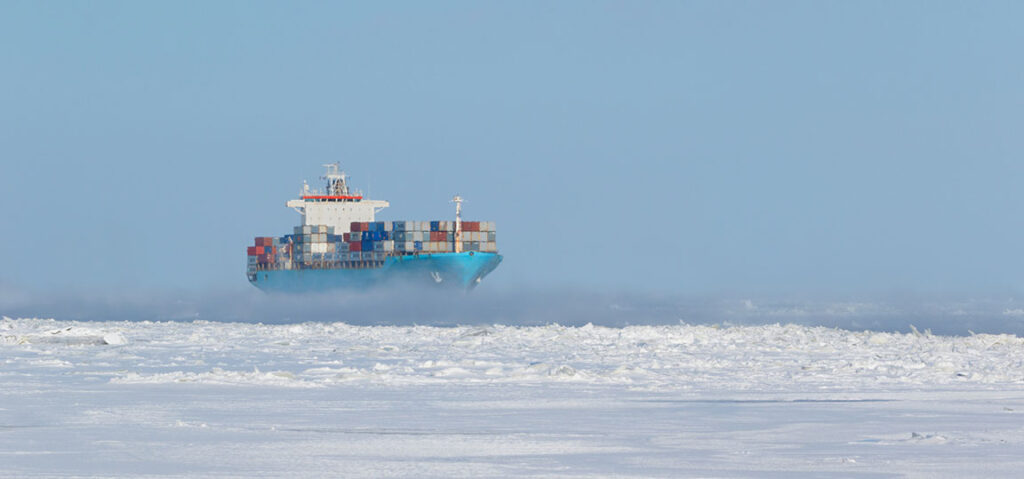Fears of a Sino-Russian alliance in the Arctic are overblown, wrote an Australian defense expert in a recent analysis of the relationship between Russia and the People’s Republic of China. AFP/GETTY IMAGES
THE WATCH STAFF
Increasing economic and military cooperation between the People’s Republic of China (PRC) and Russia – and the seeming emergence of an authoritarian axis – is causing concern among many observers in the international community. The PRC-Russia relationship, though, is largely transactional and could fray in the coming years as the underlying tensions between the two increase while global competition in the region heightens, wrote Dr. Elizabeth Buchanan in an analysis written for the Royal United Services Institute, a Canadian think tank on military and national security issues.
Buchanan, a former Australian Department of Defense employee who is a senior fellow with the Australian Strategic Policy Institute, wrote in May 2024 that “despite some common interests, Russia and China have different goals in the Arctic. Closer engagement between Russia and China has fueled assumptions of an emerging axis. The Arctic is often cited as evidence of Sino-Russian alignment due to their growing Arctic ties across the security, strategic and commercial spheres. Beijing frames its Arctic relationship with Russia often in terms of ‘win-win’ agreements and strategies. This term, ‘win-win,’ reflects Beijing’s Confucius thinking, and indicates that the two countries’ bilateral mutually beneficial interests in the region remain far short of the increasingly popular assumption of a brewing Arctic alliance.”
The working relationship between the PRC and Russia centers on transportation costs and resource extraction, Buchanan wrote. Also at play is the PRC’s desire for global preeminence, which necessitates a strong Arctic presence. However, the PRC’s interests in cheaper transportation costs for its exports and access to natural gas deposits doesn’t necessarily coincide with Russia’s interest in maintaining its Arctic power nor does it mesh well with the “win-win” PRC rhetoric. Chinese ships traversing the Arctic along Russia’s Northern Sea Route (the first container ship to make the journey was a Chinese vessel in 2013) can save about two weeks of shipping time compared to the traditional Suez Canal route.
Similarly, Beijing’s desire to diversify its energy imports so far haven’t yielded much tangible gain for the PRC, Buchanan wrote. Moscow has long been leery of falling into economic dependence for its resource extraction-based economy and limits joint ventures and foreign ownership of energy deposits. At the same time, Russia depends on Chinese demand for its liquified natural gas. “This is a delicate balance,” wrote Buchanan. In fact, it might unravel under the strain of PRC ambitions in the region. Russian gas projects have a diverse clientele of investors, including strong Western allies such as France and Japan and partner nations like India. So far, the PRC hasn’t gained much of a foothold as it has in other parts of the world, Buchanan noted.
Another pressure point between the two powers is the Northern Sea Route, which closely hugs the Russian coast for much of the route, falling into its exclusive economic zone (EEZ). Russia charges transit fees for ships to use the route along with a bevy of other restrictions on foreign vessels, including a requirement that all ships must be accompanied by Russian nuclear icebreakers. “Tapping into NSR (Northern Sea Route) potential is thus subject to strict Russian directives,” Buchanan wrote. So far, the PRC hasn’t pushed back on this despite having two icebreakers of its own. Strikingly, Strider, a strategic intelligence company, released a February 2024 report, stating that “there’s a noticeable shift towards increased reliance on companies owned by the PRC and private investments to facilitate the development of the Northern Sea Route (NSR) and the infrastructure for energy exploration, processing, and transportation.”
Indeed, tensions have long festered between the neighbors since the Cold War, Buchanan wrote, noting the June 2020 charges of treason brought by Russia against one of its leading Arctic scientists, Valery Mitko, who was accused of spying for the PRC and providing classified information on Arctic research and submarine sensor technology to Beijing. Buchanan argues that both nations have swept the incident under the rug to preserve their current mutually beneficial relationship. Some observers have reached different conclusions. A 2020 analysis from a Norwegian researcher for the Arctic Institute, a Washington think tank, concludes a full-blown alliance is likely. Growing economic ties and a mutual antipathy to the U.S. “will likely also lead to a gradually expanded Sino-Russian Arctic economic partnership, albeit with certain fits and starts,” wrote Dr. Christopher Weidacher Hsiung, a senior researcher at the Norwegian Institute for Defence Studies. Although the U.S. and its NATO and Western allies have taken note of the closer cooperation between Russia and the PRC, their working relationship shouldn’t be misinterpreted, Buchanan concludes. “Russia watches, with tempered suspicion, Beijing’s Arctic high sea missions and scientific research agenda in what China sees as a global commons. Yet within the Russian Arctic Zone, Russia welcomes Chinese engagement, but on the Kremlin’s terms,” Buchanan wrote.

